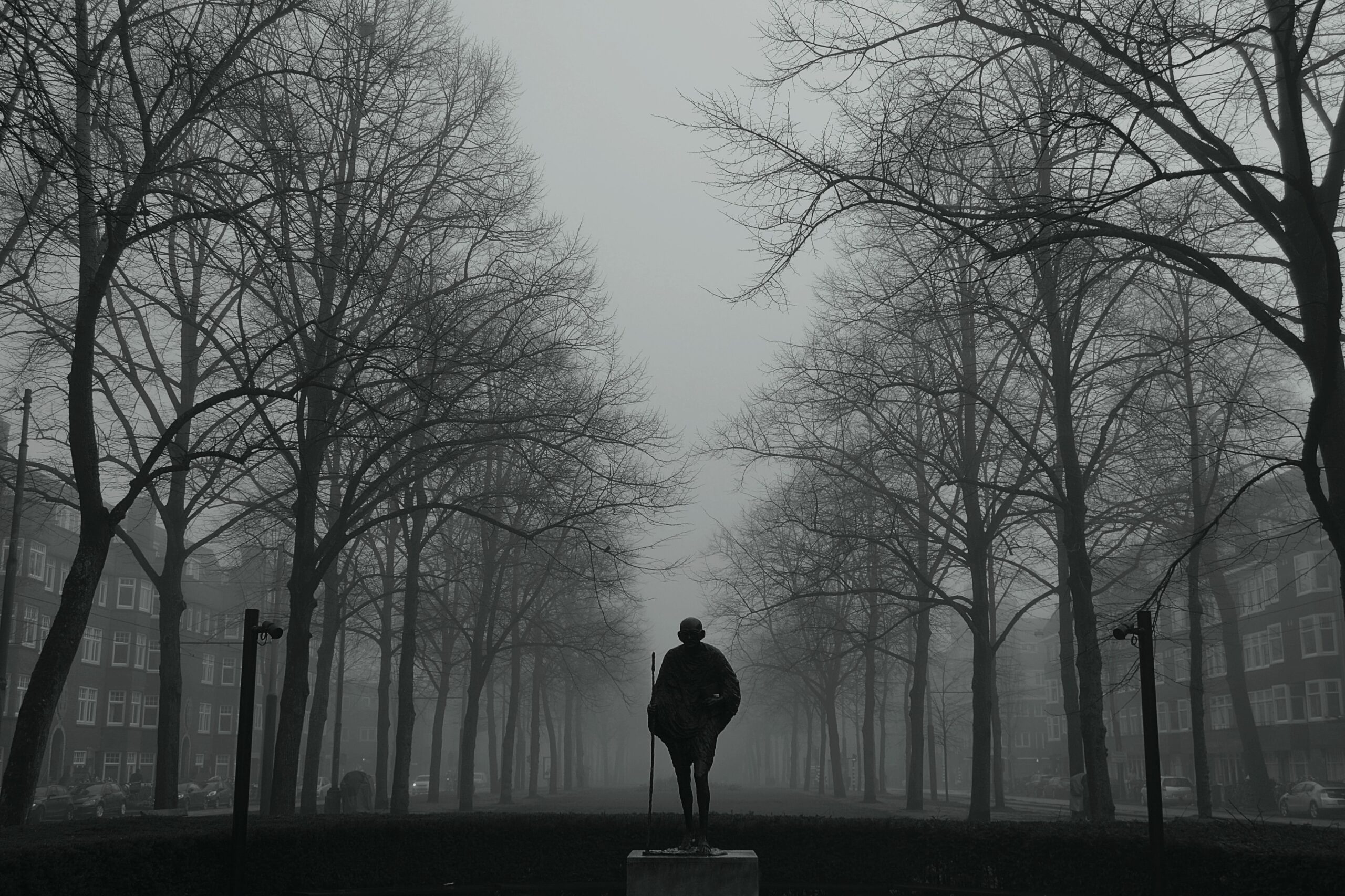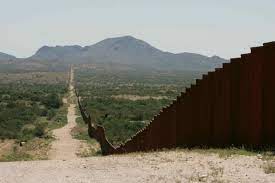Under the fluttering tricoloured flag at Lahori Gate Red Fort, two sparrows greeted each other. One, wearied and its plumage bespeckled red, gasped and mumbled, “I escaped from the bloodshed in Punjab.” The other sparrow, all aglow, chirped, “I flew from Calcutta, witnessing love, unity and peace.” She then detailed what she had observed, perched on the roof of the Hyderi Manzil, in a Muslim locality in Beliaghata just hours after the dominion flag had unfurled.
Seated in the eastern corner of one of the two habitable rooms of the seven in the Hyderi Manzil, Bapu ceaselessly spun the charkha. While his lips chanted the name of Lord Ram, he raised his eyes and beckoned a young student.
“Can you inform Bisen to come in with the writing materials?”
Bisen positioned himself across Bapu with his pen poised. Bapu dictated letters without a pause in his spinning. In the letter, he mentioned that he celebrated important events by thanking and praying to God. Also, by fasting and dedicating the day to spinning.
He looked at the student and said with a chuckle, “If drinking fruit juices may be described as a fast.” Then Bapu continued with the dictation, ruing about the condition of Rajaji in the Government house, surrounded by a crowd of revellers. Again, to the youth, he softly said, “It pains me to hear about our brothers swarming into the Government House, behaving in a disorderly manner, pilfering and damaging property. Rajaji is unable to come to meet me; he is like a prisoner there. One must maintain ahimsa at all times, in sadness and joy.”
By the time Bapu completed the letter, echoing cries of ‘Vande Mataram’ rent the air. A commotion ensued outside, and in walked briskly, the Governor of Bengal, C. Rajagopalchari. He took Gandhi’s hands in his and held them, neither saying a word.
Then, sitting beside Bapu, he said, “You have succeeded. And have wrought a miracle, the peace in Calcutta.”
“Ah, my dear brother. We have succeeded. It’s a collective effort. It is no miracle. I cannot be satisfied until Hindus and Muslims feel safe in each other’s company and return to their own homes to live as they did. But I’m happy to see you. I apologise for my riotous brothers.”
“It was indeed sad to be stuck inside. But our men are jubilant. I hope the bars of division melt away.”
“Yes, without that change of heart, there’s a likelihood of future deterioration, despite the present enthusiasm.”
“Hmm.” Gazing at the dilapidated condition of the accommodation, Rajaji added, “You seem to be comfortable here. You cannot possibly live in the Government House. I’m struggling to familiarise myself with the Burrows bungalow. Such large rooms!”
H.S. Suhrawardy, the Muslim League Leader, joined the impromptu meeting.
“Gandhiji likes to live with people. He has no fascination for palaces,” Suhrawardy said.
“That’s why he was put in the Aga Khan Palace,” quipped Rajaji.
Bapu laughed, and the men joined in. After Suhrawardy left to attend to the crowd outside, the conversation bled into various topics.
“Sardar’s health is causing me concern. The problem with the princes is so complicated that only he can deal with it.” Bapu said.
“True, he will handle it best. All well? You appear disturbed.”
“Many things plague me. If the rains fail us, the independence will cost us dearly. I’ve written to Balvant Singh about the issue of Gaushala. The Sevagram should have cows, and the diary must work.”
“Hmm. The issue will get sorted out. Bapu, you were planning to go to Noakhali. Why did you shift here from Sodepur?”
“Suhrawardy and I agreed to stay together in a turbulent area. In fact, at the prayer meeting two days ago, when Suhrawardy didn’t join me, some of the young men shouted for his blood and began pelting stones. It pained me so much. Then Suhrawardy made an unequivocal admission of responsibility for the killings of last year. This profoundly affected the crowd. It was a turning point and had a cleansing effect. I could sense it.”
A lady entered the room carrying fruit juice for Bapu and a glass of buttermilk for Rajaji.
“How are Devdas and Lakshmi?” Bapu asked, sipping the juice.
“They are fine. I met the grandchildren. They are quite naughty.”
“What can you expect? They are our grandchildren!”
“Haha. True. I received a letter from Sardar. He mentioned Subhash Bose.”
“I find it difficult to believe that ‘in exile’ Bose has married and has a 4-year-old child.”
“Yes, I was surprised too. His brother Sarat Bose is still furious at me.”
“Hmm. Lord Ram should set things right.” Bapu’s face lit up as he added, “It heartened me to hear that Hindus visited masjids and Muslims visited temples today to show solidarity.”
“I heard about it. Also, there was a football match between two warring clubs where they swapped players. Such instances of brotherhood give me hope.”
“Ram! Ram!”
The two distinguished men pulled their watches out at the same instant.
“So, I bid you farewell, Bapu.”
“I should get going too. It’s time for my evening prayer.”
Gandhiji walked to Rash Bagan Maidan to address a roaring crowd. A sea of people buried the streets, but there was pin-drop silence as Bapu began his prayers, followed by a speech. First, he congratulated Calcutta about the Hindus and Muslims meeting together in perfect camaraderie. Then, he expressed his grief for the Muslims who experienced horrifying molestation. Further, he hoped that the country would be rid of the communal virus entirely.
Bapu then returned to his humble quarters and lay on the mattress. His lips moved silently, taking the name of Lord Ram.
“I overheard Mountbatten saying that in Punjab with 55000 soldiers, there was colossal bloodshed. But Gandhiji, as a one-man boundary force, maintained peace in Calcutta.” Said the sparrow from Punjab.
“Yes, he is a Mahatma!” The other sparrow bowed.
****
Glossary
Shiv Balak Bisen – Stenographer of Gandhiji.
HS Suhrawardy was the Prime Minister of Bengal till 14th Aug 1947 later became the 5th prime minister of Pakistan. He orchestrated the massive bloody riots on 16th Aug 1946, known as the Great Calcutta Killings.
Aga Khan Palace (Pune) – Where Gandhiji, along with his wife, was imprisoned. Kasturba Gandhi died during the period, and her samadhi is located there.
Devdas Gandhi is married to Rajaji’s daughter Lakshmi.
Sevagram – Gandhiji’s ashram and residence from 1936-1948 (until his death.)
Authors note
This is an attempt at a peek at Gandhiji’s life for a few hours after India gained independence.
I have given my own spin of the conversation between Bapu and Rajaji, based on historical facts gleaned from The Collected works of Gandhiji.
As I researched, I was pulled into the annals of history and ended up stuffing my head with too much information. With great restraint, I avoided dumping all the data into this. Still, a lot have crept in!
Event Sponsored by Kasturi Patra, Published Writer, A Mother’s Goodbye
Can a woman be a mother at the cost of being herself? Can circumstances force a child to be a mother? To know the answers, do read Kasturi Patra’s A Mother’s Goodbye, a poignant tale of a woman, her children, and a mother who said did not say good bye.
[zombify_post]








Written very well Ma’am. I doubt whether you’ve visited Kolkata but the way you brought the Bapu’s endless desire and his endeavour to bring peace in Bengal, is great…right from Beliaghata to sodepur, Noakhali….perfect articulation
Thank you. I wish to visit Kolkatta someday soon. We should respect and be thankful to the freedom attained
after such struggles… Hope peace always prevails in our country.
Great spin on the conversation Sangetha. I read of the incident of HS Suhrawardy and his apology at Gandhi jis behest and remember thinking hat would make for a great story.
Thank you. Yeah, that’s a great premise to spin a story.
I enjoyed this one, Sangeetha.
Thank you.
Quite a lot of info, but still innovative
Thank you. I toned it down a lot!